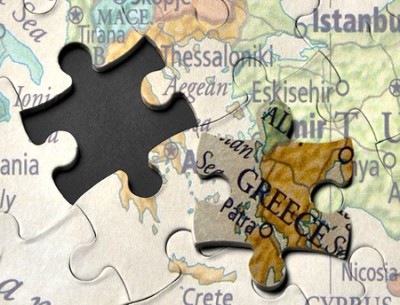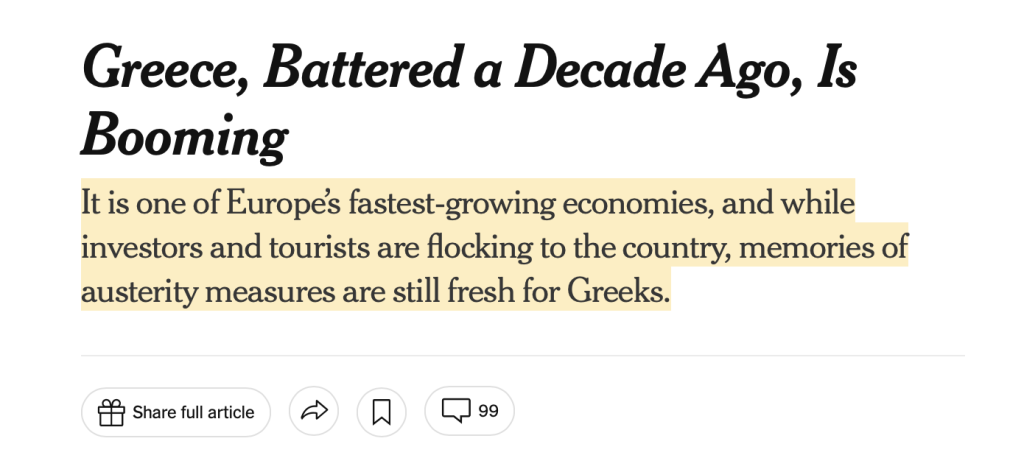“Economic Miracle” or Mass Poverty in Greece? “A Strong Economy means Neoliberalism”
A Greek immigrant responds to the NYT

All Global Research articles can be read in 51 languages by activating the Translate Website button below the author’s name.
To receive Global Research’s Daily Newsletter (selected articles), click here.
Click the share button above to email/forward this article to your friends and colleagues. Follow us on Instagram and Twitter and subscribe to our Telegram Channel. Feel free to repost and share widely Global Research articles.
***
New York Times published a news article “Greece, Battered a Decade Ago, Is Booming” by Liz Alderman, with additional reporting from Niki Kitsantonis (Monday, Sept. 25 / in print on Saturday, Sept. 30, Section B, Page 1 with the headline: “A New Era of Prosperity for Greece”).
Screenshot from The New York Times
The article informs us that Greece was hit by an economic crisis a decade ago. It had, then, a load of debt – (doesn’t it now?) – which it could not repay and almost left the eurozone. So far so good.
The newspaper informs that today it is one of the fastest growing economies in Europe. Again, so far so good.
And clearly, the famous credit rating agencies are upgrading Greece’s debt rating and thus, opening the way for large investors and the economy is growing at twice the rate of the eurozone average. That’s right. CEPR economist Dean Baker, commenting on the article after its publication, wrote with emphasis: “Since the eurozone growth rate for 2023 is projected to be 0.8 percent, growing twice as fast is a rather low bar.”
The journalist mentions that unemployment is at 11 percent, which one would say, with a dose of humor, is “Greek statistics” because the probability is that unemployment is much higher. (Greece’s past government falsified fiscal data in order to enter eurozone.) Dean Baker will point out though, “The 11 percent unemployment rate is far higher than the rest of the European Union, which has a 5.9 percent unemployment rate.” Everywhere in Greece there is poverty, and mine conditions in society.
I am one of the Greeks living in New York, and I have received many messages and phone calls from Greek people who want to immigrate to America because they cannot make ends meet. Friends and family members ask me the same. They are forced to do two-three jobs to survive. The minimum wage is 780 euros (650 net). So, how is it that the article describes “a miracle”? One would say that even the examples of the people mentioned in the article are not typical.
And the tourists who have returned en masse, as the article states, has not helped to improve incomes. On the popular islands – that the average Greek cannot visit – usually, there are galley conditions for the workers.
Unfortunately, in Greek society, a small percentage of 5%-10% live well – “the oligarchs eat with golden spoons” – and the rest suffer. Children of the poor go to school hungry.
The country has some of the most expensive fuel in Europe, expensive food, high VAT, and very expensive electricity. Many do not have money for dental care, to change tires on the car, or, to start a new family. The journalist writes “misery of austerity is still fresh”, no, it is not fresh; it is still present in the social conditions. Nowhere is mentioned that the government gave, until recently, “Soviet-style” Food Pass and Fuel Pass coupons, which helped the re-election by a landslide of the conservative leader Mr. Mitsotakis. This image is not beautified by the fact that the companies Microsoft and Pfizer are investing in Greece.
For reasons that are understandable, rating agencies like DBRS Morningstar and Moody’s do their job.
Very likely for them, a strong economy means neoliberalism, purchasing power that is getting worse every year, and cheap labor. And Greece is a country that lacks personalities like Chomsky, AOC and Bernie. But the NYTimes should not present these assessments while ignoring the poverty that still exists in the country that gave birth to Democracy. The NYTimes has accustomed us to a more critical look at the suffering of ordinary people.
In conclusion, “can a dead man dance?” No! So, the information given by the NYTimes should create “a complete picture” and not the opposite. Perhaps, we can accept that somehow, the good American newspaper wants to help improve the desperate economic situation that continues to impoverish the Greeks and stop the transfer of wealth to the few. Good psychology is everything, even in economy. Until then, the country will continue to live its own difficult fate, its own 1929, similar to the conditions America experienced at the start of the Great Depression era.
*
Note to readers: Please click the share button above. Follow us on Instagram and Twitter and subscribe to our Telegram Channel. Feel free to repost and share widely Global Research articles.
Dimitris Eleas is a new immigrant in America. He is a New York-based writer / article writer/ activist / political scientist and contributes to SLpress (Athens) and The National Herald (NYC). You can contact him via e-mail: [email protected].


